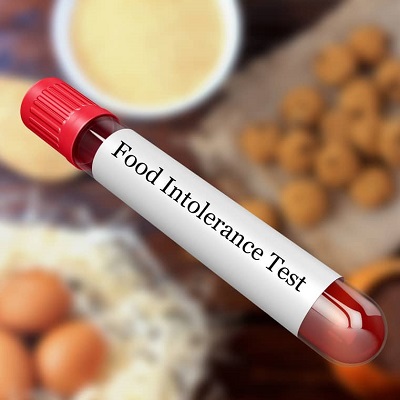Our Food Intolerance & Allergy Tests can assist you Identify the foods that are Contributing to your Symptoms.
Table of Content
What is Food Intolerance and Allergy Testing?
Food Intolerance and Allergy Testing in Abu Dhabi are techniques that are utilized to determine an individual’s precise response to specific foods.
Food intolerance is a digestive response to food without the involvement of the immune system. It may result in symptoms including gas, bloating, and discomfort in the abdomen. In addition, tolerance of lactose, gluten, and histamine are a few examples of food intolerances.
Moreover, Food intolerance testing often looks for specific enzymes or compounds that the body is unable to properly digest or metabolize. Food intolerance tests can be performed using either a blood test or a skin prick test.
Whereas, Food allergy and intolerance testing are used to identify particular foods or chemicals that an individual may respond negatively to. Food allergy testing examines for an immune system reaction to a particular food or item such as rashes, swelling, difficulty in breathing, and anaphylaxis. The immune system’s response to specific dietary proteins results in food allergies. Some common food allergies are allergies to fish, shellfish, milk, soy, eggs, peanuts, and tree nuts.
What are the Methods for Testing?
There are several different methods that are performed by Dr. Hany Chidiac & used to evaluate for food intolerances and allergies, including skin prick tests, blood tests, and elimination diets.
Skin Prick tests:
Scratch tests, commonly referred to as skin prick tests are a rapid, simple, and reasonably priced approach to screen for allergies. A needle is used to puncture the skin after the allergen has been applied carefully. An allergy may be indicated by the appearance of a raised lump or redness.
Blood tests:
Blood tests such as the Radioallergosorbent test or Enzyme-linked Immunosorbent Assay are utilized to detect the presence of specific antibodies in the blood that are connected with an allergic reaction.
Elimination of food:
Elimination of food includes eliminating food from the diet for a specific period of time and then restoring them to notice if symptoms occur without them or not. This method can be used to identify food intolerances.
Questions Frequently Asked by the Candidates:
Below are mentioned a few major questions that are asked by the candidates at Enfield Royal Clinic.
What are the most common food intolerances and allergies?
Peanuts, tree nuts, fish, shellfish, cow’s milk, eggs, and wheat are the top food allergens. The most common food intolerances include sugar malabsorption, lactose intolerance, and gluten intolerance. Lactose intolerance is characterized by difficulties digesting lactose, a sugar found in milk and dairy products (difficulty digesting fructose, a sugar found in fruits and some processed foods)
How to determine whether a food allergy or intolerance is the reason for the symptoms?
Although the symptoms of a food allergy and intolerance can be similar, the underlying physiological causes vary. A food allergy is brought on by an immune system response to a particular food or item, whereas a food intolerance is brought on by a problem with the digestion or processing of a particular food or chemical.
Are there any other approaches to testing for food allergies and intolerances?
Elimination diets, in which a person misses out on a certain food or group of foods from their diet and then gradually reinstates them to see if symptoms reappear. In addition, blood tests and skin prick tests are the most popular food allergy and food intolerance tests.
Other alternatives there are stool tests, breath tests, and hair analyses. However, these techniques are less common and may not be as reliable as blood and skin prick tests.
What does the Testing Include?
Below are mentioned a few evaluations that will be conducted by an expert specialist:
- Patient Information:
This includes the name, age, sex, & other demographic information. - Main Issues:
The main issue for seeking the test, such as the precise symptoms or condition. - History of present illness: A detailed explanation of the candidate’s symptoms, including when they first observed the issue, how often they occur, and any affiliated elements.
- Past medical history: Details about the candidate’s past medical conditions, surgeries, and medications will be required.
- Family history: It is essential to briefly tell about any medical conditions that run in the candidate’s family.
- Physical exam: Essential tests will be conducted from a physical examination.
- Laboratory & diagnostic tests: The results of any laboratory tests or imaging examinations that were performed will be evaluated.
- Differential Diagnosis: A list of possible diagnoses based on the candidate’s symptoms and test results will be conducted.
- Diagnosis: The final diagnosis, is made based on all of the information collected in the history, physical exam, and diagnostic tests of the candidate.
- Treatment: The recommended treatment plan for the candidate, including medications and any additional follow-up visits or tests will be discussed here.
Avoid Letting Food Intolerance & Allergies Control You! Get Your Test Done Today!
Get peace of mind with proper & reliable Food Intolerance and Allergy Testing in Abu Dhabi by filling out the form below. Dr. Hany Chidiac assures assisting our valuable with the best and the most effective tests & solutions that will definitely sort out all the issues as he is having an experience of 20+ years! So stop thinking any further, and book us!









 Start
Start